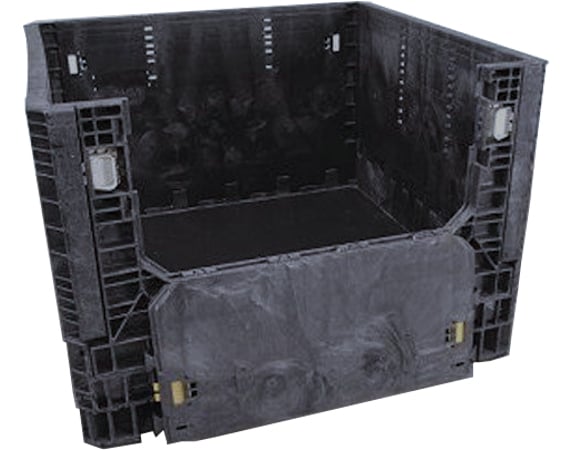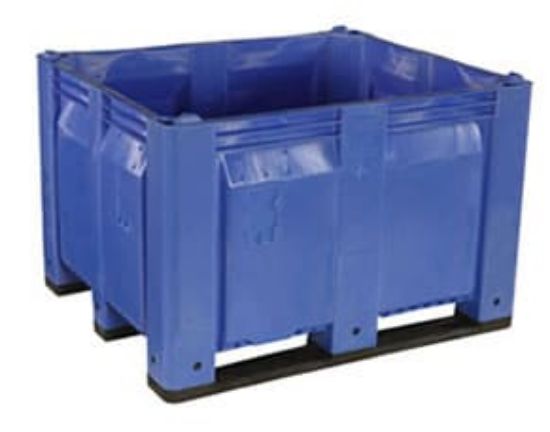Used collapsible containers as eco-friendly options for smart storage systems
The Ultimate Guide to Choosing the Right Bulk Containers for Your Company Needs
Choosing the suitable mass containers is important for any company that depends on reliable logistics. Various kinds of containers exist, each created for certain products and applications. Variables such as size, product compatibility, and regulatory standards play a significant role in this decision-making procedure. Understanding these aspects can cause boosted functional efficiency. Nonetheless, many services neglect vital facets that could improve their total effectiveness and sustainability. What are these considerations?
Recognizing Different Sorts Of Mass Containers
Bulk containers offer as essential devices for businesses seeking effective storage and transport remedies. These containers come in different types, each designed to satisfy particular operational needs. One common type is the intermediate bulk container (IBC), which is perfect for liquid and granulated materials, supplying a balance of capacity and maneuverability. An additional preferred alternative is the bulk bag, or FIBC, appropriate for dry, flowable products. These flexible containers are lightweight and can be quickly carried and kept. For heavier materials, inflexible mass containers are typically utilized, offering toughness and security for secure handling. Furthermore, there are customized containers tailored for unsafe products, making sure compliance with safety and security policies. Understanding the unique attributes of these mass container kinds permits services to make educated choices that optimize logistics and lower prices. By choosing the appropriate container, business can boost their functional performance and simplify their supply chain procedures.
Trick Product Factors To Consider for Bulk Containers
When picking bulk containers, it is crucial to consider the materials utilized in their building and construction. Elements such as chemical, resilience, and strength compatibility play a crucial duty in guaranteeing the containers fulfill details functional demands. Furthermore, weight and portability worries can influence both effectiveness and transportation logistics.
Material Toughness and Toughness
Longevity and stamina are critical variables in choosing materials for bulk containers, as they directly affect the container's capacity to stand up to numerous ecological problems and dealing with procedures. Materials such as high-density polyethylene (HDPE), polypropylene, and stainless steel are commonly preferred for their durable buildings, using resistance to effect, abrasion, and temperature fluctuations. The option of material also affects the overall lifespan of the container; more powerful materials usually cause less constant replacements, leading to cost financial savings in time. In addition, the weight of the material can affect delivery expenses and ease of handling. Services have to consider their certain functional environments and the possibility for wear and tear to guarantee peak longevity and stamina in their bulk container choice.
Chemical Compatibility Factors
Comprehending chemical compatibility is necessary for picking mass containers, as the materials utilized have to withstand the particular materials they will certainly hold. Various elements affect compatibility, consisting of the chemical nature of the components, temperature level, and duration of storage space. For example, corrosive chemicals might need containers made from stainless steel or specialized plastics that withstand deterioration. In addition, responsive compounds can produce heat or gases, necessitating aired vent or pressure-rated containers. The choice of container material, whether polyethylene, steel, or polycarbonate, should straighten with the chemical homes of the saved substances to avoid leaks or breaches. Eventually, an extensive evaluation of these compatibility elements assures secure handling and storage space, securing both personnel and the environment while preserving product honesty.
Weight and Mobility Issues
Picking bulk containers involves not just assessing chemical compatibility yet likewise considering weight and portability. Services should examine the convenience of handling and transportation to maximize performance. Light-weight products like high-density polyethylene (HDPE) or aluminum can facilitate easier activity and reduce shipping expenses. Alternatively, heavier containers may offer boosted resilience however can impede mobility, especially in environments calling for constant moving. Furthermore, the layout of the container should allow for hassle-free lifting and stacking, making sure ergonomic security for employees. Firms need to also think about the framework available for transportation; for example, containers suitable with forklifts or pallet jacks can enhance operations. Eventually, the appropriate equilibrium between weight and mobility straight influences functional efficiency and price effectiveness.
Sizing Your Mass Containers for Ideal Efficiency
When sizing bulk containers, businesses have to very carefully examine the measurements required to fit their details products. In addition, weight capacity is an important factor that influences performance and safety and security throughout transportation and storage. Effective sizing not just optimizes space but additionally enhances functional process.
Figuring Out Container Dimensions
Selecting the best dimensions for bulk containers is vital for taking full advantage of performance in storage space and transportation. Businesses have to analyze their specific needs, taking into consideration aspects such as available space, the nature of the goods being kept, and the techniques of transport utilized. Exact measurements guarantee that containers fit preferably in warehouses and lorries, decreasing wasted room and minimizing dealing with time. Standard sizes can provide convenience, however custom-made measurements may be necessary for unique needs or to accommodate certain products. In addition, it is very important to evaluate piling abilities and ease of access, as these aspects affect total functional performance. Ultimately, the right dimensions cause enhanced organization and structured logistics, profiting the total performance of the service.
Weight Capacity Considerations
Understanding weight capacity is vital for organizations intending to optimize their bulk container efficiency. The weight ability of a container straight affects storage space abilities, transport logistics, and general functional costs. Selecting containers with the appropriate weight limitations guarantees that services can safely save and deliver their goods without taking the chance of damage or conformity concerns. Straining containers can result in structural failings, while underutilizing capacity outcomes in lost sources. It is important for businesses to examine their product weights and consider any regulatory needs when picking containers. Additionally, factors such as the sort of product, meant usage, and ecological conditions need to likewise influence weight ability decisions. By assessing these aspects, companies can boost effectiveness and assure a structured supply chain.
Regulatory Conformity and Security Criteria

Governing compliance and safety and security criteria play a vital duty in the selection of mass containers for services. Organizations should ensure that their containers satisfy various policies set by neighborhood, national, and global authorities. These criteria frequently concern product safety, architectural honesty, and correct labeling, which assist prevent accidents and assure the secure transport of items.
Furthermore, adherence to industry-specific guidelines, such as those from the Food and Drug Administration (FDA) or the Occupational Security and Health And Wellness Administration (OSHA), is crucial for business handling harmful products or food more tips here products. Non-compliance can result in fines, legal issues, or damages to a service's reputation.
Businesses must also think about the container's compatibility with the products being kept or transported to stay clear of contamination or chain reaction (used plastic containers). To sum up, understanding and carrying out regulatory conformity and safety standards is important for the reliable and responsible use bulk containers
Sustainability Options for Eco-Friendly Bulk Containers

Business are also discovering options made from recycled products, which not only conserve sources however additionally sustain the reusing industry. Advancements in layout enable for lighter containers that need less power to transport, even more enhancing sustainability. By integrating these green mass container alternatives, services can demonstrate their commitment to environmental stewardship while satisfying consumer need for lasting techniques. This shift not just assists the earth but can likewise improve brand reputation and client loyalty.
Cost-Effectiveness and Budgeting for Bulk Containers
While several organizations concentrate on sustainability, cost-effectiveness continues to be an important factor when choosing bulk containers. Organizations needs to assess the first purchase price, in addition to long-lasting functional prices, to assure financial practicality. Elements such as reusability, durability, and maintenance play a substantial function in identifying total expenditures.
Buying top notch containers may produce greater upfront costs but can lead to cost savings through reduced substitute prices and lowered waste. Additionally, organizations need to think about transport costs and storage space performance, as these can influence the total budget.

Regularly Asked Concerns
Exactly how Do I Determine the Right Container for Hazardous Products?
To establish the ideal container for unsafe materials, one must assess compatibility with the substance, take into consideration the container's material, look for regulatory conformity, and this contact form assess ability and safety and security features to guarantee correct handling and storage space.
Can Mass Containers Be Personalized for Certain Products?
Yes, bulk containers can be customized for details items. used collapsible bulk containers. Numerous features, such as style, material, and size, can be customized to fulfill one-of-a-kind requirements, making sure suitable safety and effectiveness for carrying and storing different items
What Is the Ordinary Life Expectancy of Various Bulk Container Kind?
The typical life expectancy of mass container types differs; plastic containers last 5-10 years, steel containers 10-20 years, and wooden containers commonly last 3-7 years, depending upon usage, maintenance, and ecological conditions.
Just how Should I Tidy and Maintain Bulk Containers?
To clean and maintain bulk containers, one must regularly check for damage, remove deposit, wash with appropriate detergents, wash thoroughly, and assurance appropriate drying prior to storage space. Complying with supplier guidelines improves long life and security throughout usage.
Exist Rental Options for Bulk Containers Available?
Yes, various companies use rental choices for mass containers, giving versatility for businesses. These leasings can suit various needs, enabling firms to manage stock effectively without the dedication of purchasing containers outright.
Sturdiness and stamina are critical elements in selecting materials for mass containers, as they straight affect the container's capacity to withstand numerous environmental conditions and managing procedures. Recognizing chemical compatibility is crucial for picking mass containers, as the products utilized must withstand the details compounds they will certainly hold. Comprehending weight ability is important look at here for companies intending to optimize their mass container performance. Regulatory compliance and security standards play a necessary function in the choice of mass containers for companies. While numerous services focus on sustainability, cost-effectiveness continues to be an essential factor when choosing mass containers.